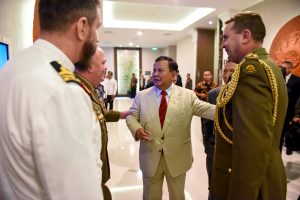Indonesian Defense Minister Prabowo Subianto will tomorrow embark on a five-day trip to the United States, after the American government lifted a long-standing ban on his entry to the country. U.S. Defense Secretary Mark Esper issued the invitation for Prabowo to visit the U.S. for a discussion of defense cooperation between the two countries, the minister’s spokesman Dahnil Anzar said.
A leading hardline general under the New Order regime of Suharto, and a former son-in-law of the Indonesian dictator, Prabowo has been credibly implicated in a litany of human rights abuses, from atrocities committed in East Timor during the 24-year Indonesian occupation to the abduction of pro-democracy activists in the months leading up to the New Order’s collapse in May 1998. Prabowo is also accused of fanning anti-Chinese pogroms that exploded at the time of Suharto’s fall. The American visa ban was instituted in 2000.
In December 2019, just over a month after his appointment as defense minister, Prabowo hired a Texas-based lobbyist in order to help pave the way for a trip to the U.S. In a filing under the Foreign Agents Registration Act of 1938, James N. Frinzi of the lobbying firm Frinzi & Associates reported that he would “aid and advise on a potential official mission to the United States” by Prabowo. He reported that he would also “advise on official entry process, and arrange political and commercial meetings that are productive to the Minister.”
It’s not clear that Prabowo need have spent the money. The Trump administration is currently pushing Southeast Asian countries to counter China’s influence in the region, particularly in the South China Sea, where Indonesia and China have seen recent tensions. Given the former general’s position as the defense minister of a nation that is both the most populous in Southeast Asia and an archipelagic nation sprawling at the pivot of Indian and Pacific oceans, it was always likely that the U.S. government would come knocking.
To be sure, the move has been highly controversial. Amnesty International described the U.S. decision to lift the ban on Prabowo’s entry to the country as “catastrophic for Indonesia’s human rights.” Meanwhile, U.S. Senator Patrick Leahy (D-VT) issued a statement stating that by approving Prabowo’s visit, President Donald Trump and Secretary of State Mike Pompeo “have shown once again that for them ‘law and order’ is an empty slogan that ignores the imperative of justice.”
Prabowo’s coming sojourn to the U.S. highlights the dilemma that Washington faces in broadening its outreach to Asian partners on the basis of shared liberal and democratic affinities. Bracketing the person of Trump, who has frequently expressed fawning admiration for Asian autocrats and their methods, this has been a major theme of the administration’s approach to competition with China. The Free and Open Indo-Pacific strategy has been explicitly premised on a vision of “open societies and open markets,” while Secretary of State Pompeo has on several occasions harangued the “free world” to close ranks against the threats posed by an authoritarian China.
Needless to say, premising competition with China on shared democratic affinities forces some creative interpretations of the political realities in Asian nations from India to Vietnam, and has invariably brought liberal means into conflict with liberal ends. Nowhere is this more apparent than in Southeast Asia, a region in which genuine examples of popular accountability are regrettably thin on the ground. Indeed, in recent years, the region has seen a regular and predictable pattern: when the U.S. and other Western powers have put pressure on Southeast Asian governments over democratic backsliding or human rights abuses, nationalist reflexes have very often pushed them in the direction of China, which has put non-judgemental engagement at the center of its foreign policy.
This explains a large part of Philippine President Rodrigo Duterte’s “pivot to China” since taking office in 2016. In January, Duterte canceled the Visiting Forces Agreement with the U.S. after the Congress banned a close ally from entering the country. (He later backtracked on the decision). In Thailand, a coup in May 2014 was followed by a souring of relations with the U.S. and improved ties with China. In Myanmar, the military’s vicious ethnic cleansing of the Muslim Rohingya minority has led the government to turn back toward a Chinese government that found itself on the outs after the country’s political opening in 2011 and 2012. In Cambodia, Western pressure over Prime Minister Hun Sen’s ongoing political repression has helped turn the nation into China’s closest ally and client in Southeast Asia.
The implication is not that the U.S. and other Western democracies should refrain from standing up against heinous abuses where and when they occur. But it does suggest the limitations of basing a foreign policy strategy on democratic affinities that among the region’s governments are partial and situational at best. At the very least, it illustrates the need for a greater deal of consistency on how the U.S. should deal with the authoritarian, corrupt and/or illiberal governments that dwell in China’s neighborhood.
As regards this latest controversy, perhaps the main portion of the blame should go toward President Joko “Jokowi” Widodo for welcoming Prabowo into his cabinet as defense minister in the first place. This took place just months after a bitter and contentious presidential election in which the former general failed for the second time to defeat Jokowi at the polls, after running a campaign marked by dalliances with conservative Muslim groups and ginned-up anti-Chinese animus. With Prabowo reportedly considering another run as president at the next election in 2024, he could well be set for the top job – and many more visits to Washington in the years to come.













